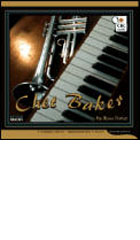
Too Cool: The Chet Baker Story 2002
Distributed by CBC Audio, P.O. Box 500, Station A, Toronto, Canada, M5W 1E6
Produced by Margaret Ingram and Ross Porter for the Canadian Broadcasting
Director n/a
AUDIO CD (3 CD set), 3 hrs.
College - Adult
Music, Biography
Date Entered: 07/15/2004
Reviewed by Rick McRae, Music Library, University at Buffalo, State University of New YorkThe life of trumpeter Chet Baker (1929-1988) exemplifies the stereotypical tragic jazz hero: a superbly gifted and creative musician living recklessly, and dying prematurely after years of excess and deterioration. Factual and fictional depictions of musicians like Baker have tended to mythologize their subject, focusing more on sensational and romanticized aspects of their lives, rather than on their musical accomplishments, as in Clint Eastwood's Charlie Parker melodrama Bird and Bruce Weber's overly stylized documentary on Baker, Let's Get Lost.
Thankfully, this 3-hour 1997 documentary narrated and co-written by Canadian jazz radio host Ross Porter avoids the easy portrayal of Baker as self-destructive artist-genius. Porter and co-author Margaret Ingram treat Baker's story with balance and perspective: as a brilliant musician but with major personal flaws. They neither excuse nor condemn him for his career-wide drug habit, his rampant womanizing and failed marriages, his abandonment of his family, and his mismanagement of finances. Covering all aspects of Baker's career from the late 1940s to the end of his life, the documentary is peppered with reminiscences by friends, army buddies, band members, producers, management personnel, and former lovers. A good deal of the material on Baker's life relies heavily on the 2000 biography by Jeroen de Valk. In fact, de Valk himself is a frequent interviewee throughout the program. We also get to hear Chet's voice, presumably from Valk's own interviews with him, often in slurred speech or world-weary in tone.
The producers supply ample musical material, illustrating Chet Baker's improvisatory skill, complete mastery of his instrument, plaintive tone, and the introspective lyricism of his melodies. Examples stem from all phases of his career, from the seminal piano-less quartet with Gerry Mulligan, several of the West Coast groups he led, the sessions featuring his singing (remarkably similar to his trumpet style), and concerts from his final years in Europe. Baker, a self-taught trumpeter who supposedly never learned to read music or understand music theory, intuitively developed a highly sophisticated harmonic sense. This program graciously affords the listener plenty of time to hear Baker's music - often tunes in their entirety, identified by title, placed in biographical context, and largely uninterrupted by narration. Yet the discussion of Baker's music is far from being uncritical; Porter emphasizes that many recorded performances from the mid-1960s and later are substandard, either as a result of Baker's drug-addled state at the time of recording, or from churning out lackluster, under-rehearsed product for fast cash and no royalties. Unlike many drug-addicted jazz musicians of his generation who were able to survive and live cleanly for the rest of their lives, Baker continued to be an unapologetic user until the end, never seeming to want to kick the habit. As a direct or indirect consequence, much of his recorded output (over 250 recordings) is uneven in quality.
The mysterious circumstances of Chet Baker's demise-found dead on a sidewalk outside an Amsterdam hotel early one morning-is treated in depth in the 3rd hour of Too Cool. The possible causes - that Chet jumped/fell/was pushed - are advocated or dismissed in turn by his biographer, Amsterdam police authorities, friends, and his final girlfriend. This mosaic of differing views as to what might have really happened the night Baker died is indeed compelling, but it does not tip the balance of the documentary. Fellow musicians esteem Baker as a soft-spoken, intimately lyrical trumpeter and singer, refreshingly counter to the usual loud-fast-and-high trumpet style of his contemporaries. Hearing the examples of Baker's brilliant late-1980s performances, with the knowledge that he was utterly physically and emotionally devastated from 30 years of drug abuse not only is poignant from a biographical viewpoint, but also astounding that a junkie hooked on heroin and cocaine can play music with such control, emotional depth and breathtaking beauty.
As it was originally aired for CBC Radio's syndicated "After Hours" jazz program, the commercial release of Too Cool is an afterthought by it’s very nature - intended to be listened to from start to finish. This represents the only shortcoming of this highly recommended CD set. The minimal liner notes consist of a brief biographical sketch. There are no track listings to navigate the listener through the various segments of the program. Moreover, although several Chet Baker record titles are mentioned throughout Porter's narrative, there lacks written discographical information; even a short list of recommended recordings would have enhanced this product. Despite this, Too Cool: The Chet Baker Story provides a splendid introduction to one of jazz's major figures, who, despite his many hardships, maintained his uniquely quiet, tender playing style, and left a legacy of excellent recordings which remain popular long after his death. Libraries with strengths in jazz or popular culture would benefit from acquiring this CD for their collections.